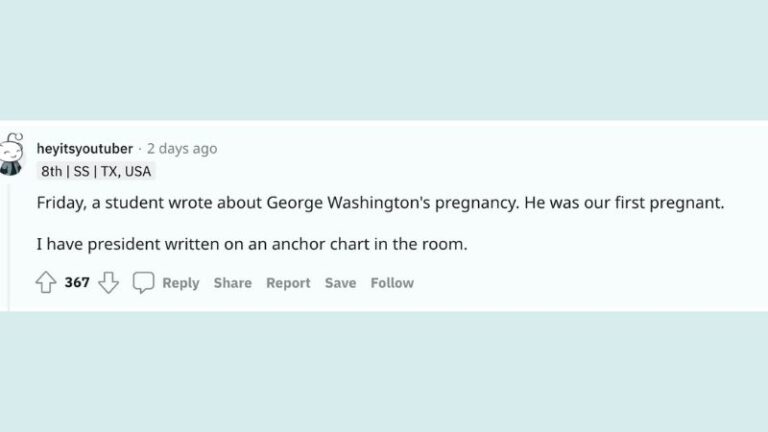Teaching: A world where everything is always perfect, where we’re free to speak our minds without hesitation, and where the challenges of the classroom are just minor bumps on an otherwise smooth road … said absolutely no teacher ever. Beneath the surface of meticulously planned lessons and neatly graded assignments lies a reality seldom shared outside classroom walls—a reality punctuated by unwritten rules about what can and cannot be openly discussed. So, what unfolds when teachers decide it’s time to break the silence and share the uncomfortable truths of teaching?
Prompted by TeacherGuy1980 on Reddit:
“What are the uncomfortable truths about education that can’t be said ‘professionally’?”
We thought we’d share some of these secret challenges and hidden frustrations that educators face daily. Get ready for a candid, uncomfortable peek into the heart of education.
There will never be enough time.
“There is not enough time and energy in me to give all the kids the attention they should be getting. I have close to 300 new students this year. I don’t even know everybody’s name yet if they are not sitting in the classroom.” —Cam515278
Large classes are ineffective.
“I teach high school. For me, I notice I start experiencing diminishing returns for every student [in excess of] 16. To me, that is the ideal class size. Every student you add above that, students will start getting less and less individual attention. By the time you hit 30, it’s just survival mode and maintaining order.” —MydniteSon
Hybrid teaching wasn’t that different pace-wise.
“During COVID, we had a time of hybrid classes. Half the class was in school, the other worked on stuff at home. Next week other way round. I only saw those kids half as often as a result, but with only 13-15 kids in the class, I got almost as much done in the end. And I didn’t feel like half the kids were slipping through the cracks.” —AnonymousTeacher333
Admin doesn’t care about breaking fire codes.
“I had 34 in a section and could only fit 33 desks in my room. When I asked what to do, I was told ‘hope that kids are absent.’ I also couldn’t do anything contractually, because the cap on class sizes was an average of 30. Since I had smaller sections otherwise, it was deemed fine.” —Joshmoredecai
Logistically, I cannot meet every kid’s needs.
“This is my issue … I see the kids whose needs I simply cannot meet while tending to 20 other kids.” —MusicalMawls
Students’ poor behavior erodes classroom instructional time.
“And don’t forget that behavior that ends up taking almost half the class period of attention to diffuse.” —LowConcept8274
Things just fall through the cracks sometimes.
“Not just grades. ‘Why didn’t you notice that kid is more withdrawn than usual?’ Because I’ve known them for 8 weeks and see them for 90 minutes a week in a class of 32 kids and they started off being a quiet kid.” —Cam515278
Good guardian communication is impossible.
“Five-minute phone calls to each of 300 families is 25 hours nonstop.” —Telvin3d
You can lead a horse to water …
“You can’t teach kids who refuse to learn.” —westbridge1157
Some human needs are met in my classroom first.
“Yep, or if their basic human needs are not being met, forget about it. I have a student who just sleeps because he is so sleep deprived. … If he feels warm and safe to sleep … go ahead buddy. I don’t wake him anymore.” —ohhpapa
My lesson plans aren’t what students need sometimes.
“I had a 12th grader back in 2012 in my 9th grade science class who worked a job, had a kid, another on the way, lived with his girlfriend because he was kicked out of his house (guess why). He did not need to learn stratification and uniformitarianism.” —2007Hokie
Students aren’t spending nearly enough time outside.
“Kids need to be outside more. 40 minutes of sunlight in a 7-hour day is insane.” —madkandy12
Middle school students really need some daily gym time.
“No learning gets done when Jimmy and Samantha are doing cartwheels in the classroom because middle school doesn’t have recess or at least gym class for every student every day. Yes, they still have gym, but at the semester point they rotate out of their electives and may have Art and Music instead of Gym and Computer Tech. They need physical activity all year. ’Cause we know they aren’t getting it outside of school for many of them.” —Latter_Leopard8439
Kids can handle learning after they get some wiggles out.
“I’m a mom lurker that does an after-school thing once a week … we found our seven first and second graders magically can maintain focus and get work done … AFTER we’ve let them play outside for twenty minutes. Other groups gasp at our decision … and are constantly frustrated by wiggly kids with no focus.” —boomrostad
Least restrictive environments are always helpful.
“Being ‘inclusive’ would mean providing me with the resources to meet the needs of all my students. That’s either more time, smaller classes, teaching assistance, tech, and so on.” —houndtastic_voyage
Schools need to hold more kids back.
“More students need to be held back a grade. I like the recent approach from Mississippi, where students who don’t pass a basic reading test in grade 3 must repeat the grade.” —liefelijk
School outcomes are normally due to parent income.
“I teach in a ‘good school.’ Consistently in the top 10 of a huge state. But a lot of the teachers who have worked here for 25 years are absolute crap. They’re not doing anything special in their rooms. But we DO have super-rich parents who have given their kids private tutors and lessons since first grade.” —booksandowls
Districts are more concerned with public perception than student outcomes.
“Schools and systems are way more concerned about how decisions are perceived by the public than whether or not they benefit the students. Cellphone policies are one great example … comments on social media drive decision making. I also get about 5 emails a week from school system asking me to vote for some person in our district for some random award and if they win, it is promoted as though it is an indication of how successful our system is.” —nebmalim
Not every environment will foster a relationship.
“You can’t expect a teacher dealing with large classes and/or a tight schedule to build a personal relationship with every student, let alone adjusting their classes to take everyone’s interests, personal quirks, etc. into account.” —diza-star
Education isn’t as powerful as backgrounds.
“School doesn’t make that big of a difference for a lot of kids compared to home. I’ve worked at fancy private schools with sh** teachers and urban public schools with great teachers and it doesn’t matter. We’re like 15% of how a kid turns out max, but society acts like we’re 95%.
Edit: Editing because I feel mild ethical guilt over the melodrama of my statement. Of course having a teacher that is skilled and cares makes a difference, especially for kids from tougher situations, but my point is that my 18 years has taught me the difference really isn’t very big. I’ve poured my heart into classes in Oakland CA and watched them mostly still struggle in life, and I’ve chilled my ass off at a private international school and watched them all breeze off to nice colleges.” —Agreeable_You_3295
Leaving teaching is healthy for a lot of people.
“Teachers quitting within the first few years because their health is declining is a good decision. ‘Most people aren’t cut out for teaching.’ Teaching is too demanding of a profession for most people, and I don’t blame them for thinking so.” —MyStrawberry
Admin aren’t helping young teachers survive.
“25 years ago when things were far better, half of all teachers quit before their 5th year. They just didn’t know enough to make it work. Now, it feels like it’s down to three years. And it’s the smart teachers who realize that the pay, workload, and constant danger just aren’t worth it. Instead of setting so many teachers up to fail, we need to make teaching safe and reasonable. Admin must take back all the responsibilities, particularly discipline, that they’ve dumped on the backs of teachers.” —MantaRay2256
Teaching is a brutal public system that disregards health.
“Most of the people who drop out are not ‘not cut out for teaching’—they are not cut out for the brutal public education system that disregards their health.” —anonymous
Teacher prep programs are idealistic, not realistic.
“Most education college courses are useless. No one writes 5-page lesson plans. All examples are also idealized classes.”—Schadenfreudian
This is just a job.
“I am not a martyr, and I’m just doing this job for the money and the summers off.” —Scruffy_Nerf_Hoarder
The honest stories shared by teachers shine a light on the tough parts of teaching that the public doesn’t often hear about. From classes that are too big to give each student enough attention to the struggles with keeping everyone on track, it’s clear that teaching is full of challenges. These stories tell us that if we want to make school better for everyone, we need to listen to teachers and work on fixing these problems together. This means smaller classes, more support for students and teachers, and changes that focus on making school a better place for learning. It’s a reminder that improving education is about more than just good grades. It’s about making sure every student gets the chance to succeed and every teacher feels supported in their important work. But this success cannot occur without teachers being heard.

